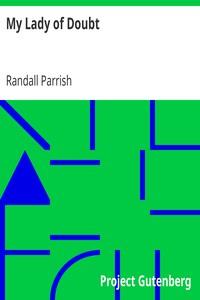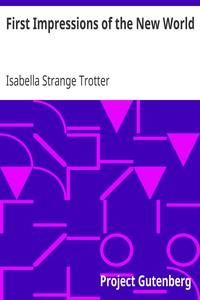Read this ebook for free! No credit card needed, absolutely nothing to pay.
Words: 49196 in 10 pages
This is an ebook sharing website. You can read the uploaded ebooks for free here. No credit cards needed, nothing to pay. If you want to own a digital copy of the ebook, or want to read offline with your favorite ebook-reader, then you can choose to buy and download the ebook.


: Moral Principles and Medical Practice: The Basis of Medical Jurisprudence by Coppens Charles - Medical jurisprudence; Medical ethics
MORAL PRINCIPLES AND MEDICAL PRACTICE.
INTRODUCTORY--THE FOUNDATION OF JURISPRUDENCE.
Gentlemen:--1. When I thoughtfully consider the subject on which I am to address you in this course of lectures, i.e., Medical Jurisprudence, I am deeply impressed with the dignity and the importance of the matter.
The study of medicine is one of the noblest pursuits to which human talent can be devoted. It is as far superior to geology, botany, entomology, zo?logy, and a score of kindred sciences as its subject, the body of man, the visible lord of the creation, is superior to the subject of all other physical sciences, which do so much honor to the power of the human mind; astronomy, which explores the vast realms of space, traces the courses and weighs the bulks of its mighty orbs; chemistry, which analyzes the minutest atoms of matter; physics, which discovers the properties, and mechanics, which utilizes the powers of an endless variety of bodies--all these noble sciences together are of less service to man than that study which directly promotes the welfare of his own structure, guards his very life, fosters the vigor of his youth, promotes the physical and mental, aye, even the moral, powers of his manhood, sustains his failing strength, restores his shattered health, preserves the integrity of his aging faculties, and throughout his whole career supplies those conditions without which both enjoyment and utility of life would be impossible.
Wages may be measured by the time bestowed, or by the effect produced, or by the wants of the laborer to lead a life of reasonable comfort; a salary is measured by the period of service; but an honorary is not dependent on time employed, or on needs of support, or on effect produced, but it is a tribute of gratitude due to a special benefactor. Whatever practical arrangements may be necessary or excusable in special circumstances, this is the ideal which makes the medical profession so honorable in society.
Your career, gentlemen, to be truly useful to others and pursued with safety and benefit to yourselves, needs to be directed by a science whose principles it will be my task to explain in this course of lectures--the science of MEDICAL JURISPRUDENCE.
In such a land, the lecturer on Medical Law would have nothing to explain; for there would be no human laws and law courts with which a physician could come in contact. But the lecturer on Medical Jurisprudence proper would have as much to explain as I have in this country at present; because he treats of the Ethics or moral principles of Medical Practice, he deals with what is ever the same for all men where-ever they dwell, it being consequent on the very nature of man and his essential relations to his Maker and his fellow-man. Unfortunately the term "Medical Jurisprudence" has been generally misused. Dr. Ewell, in his text-book on the subject, writes "While the term 'Medical Jurisprudence' is a misnomer,--the collection of facts and conclusions usually passing by that name being principally only matters of evidence, and rarely rules of law,--still the term is so generally employed that it would be idle to attempt to bring into use a new term, and we shall accordingly continue the employment of that which has only the sanction of usage to recommend it" .
I prefer to use terms in their genuine meaning; for misnomers are out of place in science, since they are misleading. Yet, to avoid all danger of misunderstanding, I will call my subject "Moral Principles and Medical Practice," and distinctly style it "The Basis of Medical Jurisprudence."
On what lines will my treatment of the subject depart from the beaten path? On the same lines on which most other improvements have been made in the science of medicine. Science has not discovered new laws of physical nature that did not exist before; but it has succeeded in understanding existing laws more perfectly than before, and has shaped its practice accordingly. So, too, the leaders of thought among physicians, especially in English-speaking countries, now understand the laws of moral nature--the principles of Ethics--more thoroughly than most of their predecessors did, and they have modified their treatment so as to conform it to these rules of morality. Hitherto Medical Jurisprudence had regulated the conduct of practitioners by human, positive laws, and sanctioned acts because they were not condemned by civil courts. Now we go deeper in our studies, and appeal from human legislation to the first principles of right and wrong, as Jurisprudence ought to do; and, in consequence, some medical operations which used to be tolerated, or even approved, by many in the profession are at present absolutely and justly condemned. The learned physician these days is no longer afraid to face the moral philosopher; there is no longer any estrangement between Ethics and Medical Practice. Medicine, sent from Heaven to be an angel of mercy to man, is now ever faithful to its beneficent mission; it never more performs the task of a destroying spirit, as--not in wantonness, but in ignorance--it did frequently before.
On these lines, then, of the improved understanding of first principles, I will now proceed to develop the teachings of Medical Jurisprudence.
From this principle it follows that a physician is not responsible to God or man for such evil consequences of his prescriptions or surgical operations as are entirely beyond his will and therefore independent of his control. If, however, his mistakes arise from his ignorance or want of skill, he is blamable in as far as he is the wilful cause of such ignorance; he should have known better; or, not knowing better, he should not have undertaken the case for which he knew he was not qualified.
But it often happens that the best informed and most skilful practitioner, even when acting with his utmost care, causes real harm to his patients; he is the accidental, not the wilful, cause of that harm, and therefore he is free from all responsibility in the matter.
Free books android app tbrJar TBR JAR Read Free books online gutenberg
More posts by @FreeBooks

: At the Back of the North Wind by Lewis Elizabeth MacDonald George Kirk Maria Louise Illustrator - Fairy tales Children's Literature







